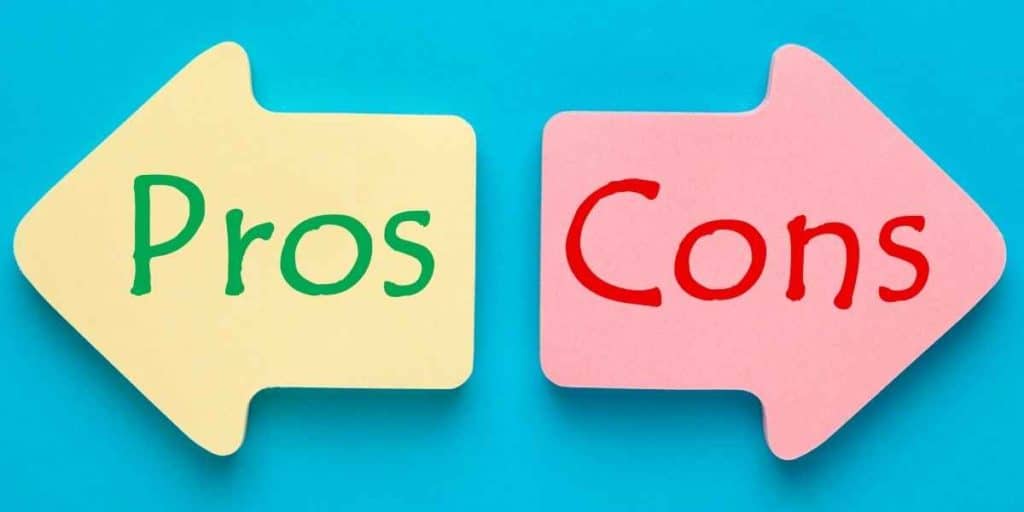Data science and computer science are often confused with one another. They’re both related to the study of data, but they don’t use the same methods or search for the same results. Are you confused yet? The good news is that you’ll learn all about both of them, as well as which one is right for you.
When it comes to data science vs. computer science, data science focuses on compiling data about any given topic, whereas computer science is the study of computers and their functions. Since data science is part of computer science, there are many overlapping variables and details between the two.
Throughout this article, you’ll also learn the following information about choosing either data science or computer science:
- Details about both career paths, including pros and cons
- Differences and similarities between DS and CS
- How much money they make and job security
- The necessary steps to become a data scientist or a computer scientist
- Examples of jobs you can do with a degree in DS or CS
Important Sidenote: We interviewed numerous data science professionals (data scientists, hiring managers, recruiters – you name it) and identified 6 proven steps to follow for becoming a data scientist. Read my article: ‘6 Proven Steps To Becoming a Data Scientist [Complete Guide] for in-depth findings and recommendations! – This is perhaps the most comprehensive article on the subject you will find on the internet!
Table of Contents
Is Data Science Computer Science?
Data science and computer science are both the study and analysis of different pools of data. Computer science focuses on the study of computers, building computers, and even coding for different types of web design.

On the other hand, data science collects data and puts it into a readable, usable format for companies, customers, and other readers. As you can see, they both ride along a similar line of collecting data and producing results.
Data science is often used as a branch of computer science. If someone wants to compile data about different types of computers or their functionality, then they’d use data science in their favor. However, it usually doesn’t work the other way around.
If you’re trying to become a data scientist or computer scientist, then you’ll learn all sorts of differences in the next section.
What Are the Differences?
Despite the similar names, data science and computer science can be very different fields of study. As mentioned above, you can use them to compile data, but it’s important to know how they differ before choosing one or the other for your future career.
Below, you’ll find a list of various differences between data science and computer science.
- According to EDUCBA, computer science focuses on the building of computers and how the storage works. In contrast, a data scientist would analyze the data and decide how to put it together . For example, they might compile how well different memory cards work, how often they sell, and how long it took to build a computer on average.
- Data science can study data about almost any topic, but computer science typically stays on the subject of computers. You can use data science to gather information about sales conversions, web page bounce rates, and many other unrelated topics. Computer scientists on the other hand try to figure out how to make computers and computing improved.
- Computer science usually figures out how to make computers work and function properly, whereas data science uses the functioning computer to gather, store, and report the data they’re focused on . In other words, when data science is the goal, computer science creates capability.
- Computer scientists care about how they can use and advance a computer’s ability, but data scientists use whatever’s at their disposal to gather data . There’s no denying that data scientists directly benefit from the job of a computer scientist. Developing quicker computers with better storage increases a DS’s output.
- Data scientists search to create the clearest, concise data available, whereas a computer scientist is far more interested in computer performance. A good metaphor would be a CS caring about the paint’s quality while the DS focuses on the quality of the art created by the paint.
As you can see, there are plenty of differences that make it a bit easier to separate data science and computer science. Now that you know how they’re not quite the same, you’ll learn how to follow either path to increase your chances of success.
How to Become a Data Scientist
You’ve been able to get a clear grasp of data science by this point. If you want to take it a step further by learning how to pursue it, this section will explain everything you need to know. It should be noted that data science is a very competitive field since it’s fairly easy to get into. If you work past the initial struggles, you’ll be good to go.

Here’s how to become a data scientist:
Decide How You Want to Get Certified
You can choose to get a college degree, work on different online courses, or go through a data science boot camp. They’re all worthwhile, but it’s needless to say that different routes will grant different permissions. Some companies might prefer a college degree over a one-month boot camp.
Also, remember to factor the cost and time spent on each route. For example, the college will take longer and cost more than any other two choices. However, some data scientists believe that the industry’s job quality and respect are more than worth the time spent earning a degree.
Choose Which Part Interests You the Most
Some data scientists focus on mathematical statistics, whereas others work with finances, housing mortgages, etc. You’re able to switch fields, but it’s not as easy as when you first start out in the field. Companies will want to know your highlights when you’re getting interviewed.
Contrary to popular belief, data science doesn’t require you to be a genius. There are simple spheres of the industry, but there are definitely hardcore, intensive formulas used in other parts of the study. Make sure you choose the right one that fits your personal preferences and abilities.
Pick the Best Courses to Educate Yourself
Just because you have a degree or a certificate doesn’t mean that you’re done working on yourself. Data science is continuously evolving and changing with business needs. New tools and methods are being developed every few years. Therefore, it is extremely necessary that you invest in various courses to keep yourself updated on the recent developments in the domain. According to Towards Data Science, there are dozens of different learning tools that are easily accessible for you to leverage to your advantage for further education.
Listed below are few of the most popular options that you might want to consider for your continued learning –
- DataCamp
- Udemy
- Coursera
- LinkedIn Learning
There are many other programs, as well. Before choosing the courses, make sure that they’re verified to work with R, Python, and other data science tools and programs. These programs are the most popular, so it’s more than likely that you’ll have to use them for the bulk of companies that you work with.
Start Networking With New Clients
As with any online career path, you’re going to be largely responsible for most of the networking that goes through your computer. If you want to make a decent income, you have to start applying and advertising yourself on various platforms. However, social media isn’t as popular when it comes to networking as a data scientist.
So how do you get clients to talk with you? There are freelance platforms and hundreds of companies that want to hire data scientists. Go at it with a mindset that you could win any of them over. You might not get an interview at every job you apply to, but you’ll eventually get a bite.
Connect With the Community
There’s a massive online community for data scientists. Although not many people know about the work that goes into the statistics they review, these communities can make you feel appreciated. They’re also a great way to learn new tips, programs, and helpful information to propel your career forward.
Even if you’re an expert data scientist, mingling with the community can prove beneficial. There’s always something new to learn, whether it’s an old suggestion that you forgot or new clients looking for work. For this purpose, multiple platforms are available such as Reddit, Quora, and other general topic discussion forums.
How to Become a Computer Scientist
Much like data science, computer science is often thought of as a saturated field. However, there’s constant growth that warrants new positions with many companies. As long as you’re able to stay updated with computer technology and capabilities, you can perform well as a computer scientist.

Here’s how to become a computer scientist:
Start With College or an Online Course
Computer scientists can choose between online courses and college degrees, or both. Both routes prove to be useful when you’re applying to companies as an individual looking to be an employee or a long-term self-employed freelance. As mentioned by Oxford Scholastica, you can take a summer course while also going to college.
If you’re able to double-down on the courses and school, you’ll drastically increase your chances of getting hired. Imagine having to interview someone who only went to a one-month course when you have two years of college and the same one-month course. You’ll be chosen every time.
Decide Which Degree You Want to Earn (Optional)
If you choose to go to college, you’ll be able to pick from a multitude of degrees. Although it might seem obvious, the best degree for a computer scientist would be computer science. However, you can also go to school for software analysis, IT, and many other degrees while still applying for computer science degrees.
On the other hand, those who decided to go for a short course won’t have such an option. They’ll be stuck with only learning about the information provided in the course. However, you can take several courses and read books or study online to further your education at your own time.
Learn the Language of the Job
There are all sorts of terms and information that you need to know about being a computer science professional. Unfortunately, they’re not all taught in schools and online courses; you’ll have to get your foot in the door to learn about the rest of it. The alternative is to watch helpful tutorials online and read blogs by various computer science professionals.
It might seem like a lot of unpaid groundwork, but it’s more than worth it. As you’ll see in a few sections, a computer science professional’s annual income is quite impressive. Not only that, but you’ll also know about the latest tech throughout the year before anyone else.
Apply to Job Listings
Once you have everything above completed, it’s time to start applying to various jobs. Just as with data science, computer science will take a bit before you get hired. Another similarity is that they can be done on a freelance platform or working for an established business. Needless to say, you’ll make more money starting with a business, but it’s a bit more difficult to start.
Keep an eye on the most popular job listing websites, such as Indeed. You can also look through the listings on Upwork, a popular freelancing website. Either way, the only method of getting hired requires you to start applying as soon as possible. If you wait too long, the knowledge you learned won’t be useful anymore.
Never Stop Studying and Learning
As you’ve hopefully read above, computer science is always evolving. Even if you’re hired and working for a company, you must keep studying on the side. If you’re not updated on current algorithms and tools, you may get replaced by a fresh student who possesses valuable info right out of college.
Much like data science, you can research and interact with CS communities. The same websites mentioned above will do just fine. Ask questions, relate to different topics, and make sure you help the beginners, too!
Is There Job Security in Both Fields?
Data science is a competitive field, as is computer science. The good news (and perhaps the bad news, as well) is that you need to be well-versed in math, science, data analysis, and modern computer languages. This issue causes many people to steer clear of the fields, leaving more room for jobs for those who pursue them.

Data Science Job Security
As Noodle mentioned, there are more data science job listings than people who are looking for data science jobs. In other words, you’ll eventually be able to find and secure a job no matter what. Since companies can’t replace you as easily, it’s very unlikely that you’ll be fired or let go aside from economic reasons.
Another reason that data science has such a high job security rate is that there are always new things to research. Almost everything in the world has statistics that need to be analyzed. From the value of adding a new product to a store to how many steps an animal takes in a day, everything can be studied and compartmentalized.
Computer Science Job Security
According to Rasmussen University, there’s not much fear of job security in the field of computer science. Just as with data science, there aren’t too many people who are cut out for the job. Combine that issue with the fact that the demand for computer scientists has risen exponentially in recent years, and you can see why it’s relaxing once you get hired.
If you want to keep your job for the long haul, you’ll have to stay current on new tech models and information. However, it’s not too difficult since most computer science jobs provide the information as you move along. The pay’s great, job security is excellent, and there are plenty of opportunities to switch to a new employer.
What Jobs Can a Data Scientist Perform?
Data science, also known as the science of data, is valuable in almost all sorts of fields. Any company that wants information to drive sales, customers, and better traffic will need the help of a data scientist. There’s also the ever-increasing demand for unique info about any topic in the world.
As Northeastern University mentioned, many of the jobs in data science rely on one another to function properly.
Let’s run through a list of five jobs that a data scientist can do:
Data Scientist
Yes, this seems a bit obvious. However, it’s worth noting that data science is a study, job, and hobby all at the same time. If you choose to pursue data science and become a data scientist, you’ll enjoy the high pay, good working hours, and job security.
Data Analyst
If you’re much more interested in recent market trends and how they can improve your company’s work, this is a solid career choice. Data analysts usually focus on reading and interpreting data rather than compiling and gathering the data for the task at hand.
Statistician
The job of a statistician is to collect the data for a data scientist to use. In other words, the statistician gathers data and gives it to the data scientist who compiled it and sent it to the data analyst. As you can see, these jobs all perform irreplaceable parts of the process.
Infrastructure Architect
An IA often works to maintain existing algorithms to ensure that they’re performing as they should. They also sometimes will help create new algorithms for data input, allowing the rest of the job to go as smoothly as possible.
Machine Learning Scientist
As the name might show, this job is all about learning new algorithms, testing them, and figuring out how to optimize data collection. There are many overlaps between machine learning scientists and other jobs in the data science field, so it’s easy to see why they might be confused with one another.
What Does a Computer Science Professional Do?
Top Universities shows us that computer science is loaded with countless job opportunities. If you have a CS degree, you’ll be able to apply to numerous job listings.
Unlike data science, the vast majority of computer science careers require a degree rather than a course certificate. As mentioned earlier in the article, a course will still land you a job with a few employers.
Without further ado, let’s dive into five of the most common jobs for someone with a computer science degree below.
Cyber Security Consultant
This job allows you to stay updated with current cybersecurity threats. You’ll analyze the risks, seek out solutions, and figure out different ways to inform and protect the company that you work for. If a cybersecurity network employs you, then you’ll provide the information to their customer base.
Database Admin
A database administrator’s job is to develop, design, or operate a database for a company. In a few instances, you’ll also be tasked with protecting the database and/or ensuring that it works with modern algorithms as you might’ve with data science.
Game Developer
Perhaps one of the most popular and exciting jobs that someone with a computer science degree can do is develop video games. We’ve all heard of PC, console, and mobile gaming by now. You’ll be tasked with the development and modifications of similar video games.
Multimedia Programmer
Much like the name implies, a multimedia programmer is supposed to design and optimize multimedia applications and software for its company. You’ll develop multi-dimensional models, test the programs, and assist in the production of apps.
Systems Analyst
This job might be at the bottom of the list, but it’s often thought of as a well-paying and respected career. It requires a vast knowledge of IT solutions and the methods of improvement. As a systems analyst, you’ll have to improve information technology to ensure that it performs the designated tasks as efficiently as possible.
Should You Choose Data Science or Computer Science?
If you’re still stuck on the fence between data science and computer science, then this is the end-all-be-all section to read. You’ll learn all about the pros and cons of both careers, as well as how much money they make and different job requirements.

Pros of Data Science
- According to the University of Wisconsin, the average salary for a data scientist is over $110,000 per year. Considering that it’s almost triple the national average, it’s not too bad for a career when it comes to the business’s financial side. Sticking with the same company can grant even more income.
- Data science is more entertaining if you love random stats. Social media is filled with statistics that are fun and interesting. For those of you who find these bits of knowledge useful, data science will be incredibly interactive and beneficial.
- Data science is on the rise constantly. There’s an increasing demand for data scientists, which means you won’t have to worry about losing your job or spending too long searching for one. Also, you’ll have more leverage when you’re asking for a raise or bonus.
Cons of Data Science
- Data science can be challenging if you’re not good at math, science, and varying data. It’s an ever-changing career path, so you’ll always need to be updated on algorithms and complex mathematical formulas.
- Data science analyzes a lot of code and requires a vast knowledge of computer language. You’ll have to continue to educate yourself as times change, even if you’re not getting paid for the time spent on the books.
Pros of Computer Science
- Much like data science, computer science is always increasing in demand. Where there’s a need for computer information, there’s a job for you to pursue. You’ll have countless opportunities to find the company that best fits your preferences and the pay that you’re asking for.
- Speaking of income, Chron states that the average computer scientist makes about $103,000 per year. Although the lowest-paid employees earn just over $50,000/year, the higher end usually gets up to $150,000 or more. It’s quite a large wage gap, but seniority and experience in the field will increase your income.
- If you love videogames, then computer science is the way to go. There’s no denying the expanding interest in video games, especially as they evolve and become more complex. Whether you have your own ideas for a video game or want to support a company that you love, a computer science degree can get you there.
Cons of Computer Science
- Computer science is a broad degree that often leaves people wondering what they should do with it. You must identify a career path or a job preference before you start earning your degree.
- Computer science jobs almost always require a degree. If you’re trying to follow any of the recommended fields in the previous section, then you’ll have to get a two to four-year degree ahead of time.
Author’s Recommendations: Top Data Science Resources To Consider
Before concluding this article, I wanted to share few top data science resources that I have personally vetted for you. I am confident that you can greatly benefit in your data science journey by considering one or more of these resources.
- DataCamp: If you are a beginner focused towards building the foundational skills in data science, there is no better platform than DataCamp. Under one membership umbrella, DataCamp gives you access to 335+ data science courses. There is absolutely no other platform that comes anywhere close to this. Hence, if building foundational data science skills is your goal: Click Here to Sign Up For DataCamp Today!
- IBM Data Science Professional Certificate: If you are looking for a data science credential that has strong industry recognition but does not involve too heavy of an effort: Click Here To Enroll Into The IBM Data Science Professional Certificate Program Today! (To learn more: Check out my full review of this certificate program here)
- MITx MicroMasters Program in Data Science: If you are at a more advanced stage in your data science journey and looking to take your skills to the next level, there is no Non-Degree program better than MIT MicroMasters. Click Here To Enroll Into The MIT MicroMasters Program Today! (To learn more: Check out my full review of the MIT MicroMasters program here)
- Roadmap To Becoming a Data Scientist: If you have decided to become a data science professional but not fully sure how to get started: read my article – 6 Proven Ways To Becoming a Data Scientist. In this article, I share my findings from interviewing 100+ data science professionals at top companies (including – Google, Meta, Amazon, etc.) and give you a full roadmap to becoming a data scientist.
Conclusion
As you can probably tell by now, computer science and data science are both excellent, worthwhile careers to pursue. If you know you want to try one of them, many people would suggest working toward computer science. The degree is broad, which will allow you to do similar jobs as a data scientist.
Here’s a quick recap of the post:
- Data scientists usually make a bit more money than computer scientists.
- You can try online courses, boot camps, or college degrees.
- Job security is as good as it gets in both fields.
- Data science is a branch of computer science.
- Computer scientists focus on the study of technology and its capabilities.
- Data scientists use algorithms to generate and consolidate data for companies.
BEFORE YOU GO: Don’t forget to check out my latest article – 6 Proven Steps To Becoming a Data Scientist [Complete Guide]. We interviewed numerous data science professionals (data scientists, hiring managers, recruiters – you name it) and created this comprehensive guide to help you land that perfect data science job.
Affiliate Disclosure: We participate in several affiliate programs and may be compensated if you make a purchase using our referral link, at no additional cost to you. You can, however, trust the integrity of our recommendation. Affiliate programs exist even for products that we are not recommending. We only choose to recommend you the products that we actually believe in.
Recent Posts
Data science has been a buzzword in recent years, and with the rapid advancements in artificial intelligence (AI) technologies, many wonder if data science as a field will be replaced by AI. As you...
In the world of technology, there's always something new and exciting grabbing our attention. Data science and analytics, in particular, have exploded onto the scene, with many professionals flocking...
